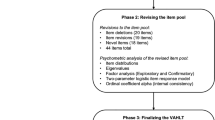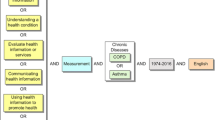ABSTRACT
BACKGROUND
Limited health literacy is associated with poor outcomes in many chronic diseases, but little is known about health literacy in chronic obstructive pulmonary disease (COPD).
OBJECTIVE
To examine the associations between health literacy and both outcomes and health status in COPD.
PARTICIPANTS, DESIGN AND MAIN MEASURES
Structured interviews were administered to 277 subjects with self-report of physician-diagnosed COPD, recruited through US random-digit telephone dialing. Health literacy was measured with a validated three-item battery. Multivariable linear regression, controlling for sociodemographics including income and education, determined the cross-sectional associations between health literacy and COPD-related health status: COPD Severity Score, COPD Helplessness Index, and Airways Questionnaire-20R [measuring respiratory-specific health-related quality of life (HRQoL)]. Multivariable logistic regression estimated associations between health literacy and COPD-related hospitalizations and emergency department (ED) visits.
KEY RESULTS
Taking socioeconomic status into account, poorer health literacy (lowest tertile compared to highest tertile) was associated with: worse COPD severity (+2.3 points; 95 % CI 0.3–4.4); greater COPD helplessness (+3.7 points; 95 % CI 1.6–5.8); and worse respiratory-specific HRQoL (+3.5 points; 95 % CI 1.8–4.9). Poorer health literacy, also controlling for the same covariates, was associated with higher likelihood of COPD-related hospitalizations (OR = 6.6; 95 % CI 1.3–33) and COPD-related ED visits (OR = 4.7; 95 % CI 1.5–15). Analyses for trend across health literacy tertiles were statistically significant (p < 0.05) for all above outcomes.
CONCLUSIONS
Independent of socioeconomic status, poor health literacy is associated with greater COPD severity, greater COPD helplessness, worse respiratory-specific HRQoL, and higher odds of COPD-related emergency health-care utilization. These results underscore that COPD patients with poor health literacy may be at particular risk for poor health-related outcomes.


Similar content being viewed by others
Abbreviations
- AQ-20R:
-
Airways Questionnaire-20R
- CHI:
-
COPD Helplessness Index
- CI:
-
confidence interval
- COPD:
-
chronic obstructive pulmonary disease
- ED:
-
emergency department
- HRQoL:
-
health-related quality of life
- OR:
-
odds ratio
- MCID:
-
minimum clinically important difference
- SD:
-
standard deviation
REFERENCES
Eisner MD, Blanc PD, Omachi TA, et al. Socioeconomic status, race and COPD health outcomes. J Epidemiol Community Health. 2011;65:26–34.
Baker DW, Wolf MS, Feinglass J, Thompson JA, Gazmararian JA, Huang J. Health literacy and mortality among elderly persons. Arch Intern Med. 2007;167:1503–9.
Davey Smith G, Hart C, Hole D, et al. Education and occupational social class: which is the more important indicator of mortality risk? J Epidemiol Community Health. 1998;52:153–60.
Blane D. Commentary: explanations of the difference in mortality risk between different educational groups. Int J Epidemiol. 2003;32:355–6.
Institute of Medicine. Health literacy: A prescription to end confusion. Washington, DC: National Academy Press, Institute of Medicine Committee on Health Literacy; 2004.
Paasche-Orlow MK, Parker RM, Gazmararian JA, Nielsen-Bohlman LT, Rudd RR. The prevalence of limited health literacy. J Gen Intern Med. 2005;20:175–84.
Gazmararian JA, Williams MV, Peel J, Baker DW. Health literacy and knowledge of chronic disease. Patient Educ Couns. 2003;51:267–75.
Scott TL, Gazmararian JA, Williams MV, Baker DW. Health literacy and preventive health care use among Medicare enrollees in a managed care organization. Med Care. 2002;40:395–404.
Schillinger D, Grumbach K, Piette J, et al. Association of health literacy with diabetes outcomes. Jama. 2002;288:475–82.
Peterson PN, Shetterly SM, Clarke CL, et al. Health literacy and outcomes among patients with heart failure. Jama. 2011;305:1695–701.
Paasche-Orlow MK, Wolf MS. The causal pathways linking health literacy to health outcomes. Am J Health Behav. 2007;31(Suppl 1):S19–26.
Roberts NJ, Ghiassi R, Partridge MR. Health literacy in COPD. Int J Chron Obstruct Pulmon Dis. 2008;3:499–507.
Trupin L, Earnest G, San Pedro M, et al. The occupational burden of chronic obstructive pulmonary disease. Eur Respir J. 2003;22:462–9.
Eisner MD, Trupin L, Katz PP, et al. Development and validation of a survey-based COPD severity score. Chest. 2005;127:1890–7.
Chen H, Eisner MD, Katz PP, Yelin EH, Blanc PD. Measuring disease-specific quality of life in obstructive airway disease: validation of a modified version of the airways questionnaire 20. Chest. 2006;129:1644–52.
Blanc PD, Eisner MD, Trupin L, Yelin EH, Katz PP, Balmes JR. The association between occupational factors and adverse health outcomes in chronic obstructive pulmonary disease. Occup Environ Med. 2004;61:661–7.
Katz PP, Gregorich S, Eisner M, et al. Disability in valued life activities among individuals with COPD and other respiratory conditions. J Cardiopulm Rehabil Prev. 2010;30:126–36.
Kim J. Atlas of respiratory disease mortality, United States: 1982–1993. Cincinnati, OH: Department of Health and Human Services, National Institute for Occupational Safety and Health; 1998.
Radeos MS, Cydulka RK, Rowe BH, Barr RG, Clark S, Camargo CA Jr. Validation of self-reported chronic obstructive pulmonary disease among patients in the ED. Am J Emerg Med. 2009;27:191–6.
Tisnado DM, Adams JL, Liu H, et al. What is the concordance between the medical record and patient self-report as data sources for ambulatory care? Med Care. 2006;44:132–40.
Straus SE, McAlister FA, Sackett DL, Deeks JJ. Accuracy of history, wheezing, and forced expiratory time in the diagnosis of chronic obstructive pulmonary disease. J Gen Intern Med. 2002;17:684–8.
Chew LD, Bradley KA, Boyko EJ. Brief questions to identify patients with inadequate health literacy. Fam Med. 2004;36:588–94.
Chew LD, Griffin JM, Partin MR, et al. Validation of screening questions for limited health literacy in a large VA outpatient population. J Gen Intern Med. 2008;23:561–6.
Wallace LS, Rogers ES, Roskos SE, Holiday DB, Weiss BD. Brief report: screening items to identify patients with limited health literacy skills. J Gen Intern Med. 2006;21:874–7.
Sarkar U, Schillinger D, Lopez A, Sudore R. Validation of self-reported health literacy questions among diverse English and Spanish-speaking populations. J Gen Intern Med. 2011;26:265–71.
Davis TC, Long SW, Jackson RH, et al. Rapid estimate of adult literacy in medicine: a shortened screening instrument. Fam Med. 1993;25:391–5.
Omachi TA, Katz PP, Yelin EH, et al. The COPD Helplessness Index: A new tool to measure factors affecting patient self-management. Chest 2010;137(4):823–30.
Peterson C. Learned helplessness and health psychology. Health Psychol. 1982;1:153–68.
Hajiro T, Nishimura K, Jones PW, et al. A novel, short, and simple questionnaire to measure health-related quality of life in patients with chronic obstructive pulmonary disease. Am J Respir Crit Care Med. 1999;159:1874–8.
Alemayehu B, Aubert RE, Feifer RA, Paul LD. Comparative analysis of two quality-of-life instruments for patients with chronic obstructive pulmonary disease. Value Health. 2002;5:437–42.
Omachi TA, Yelin EH, Katz PP, Blanc PD, Eisner MD. The COPD severity score: a dynamic prediction tool for health-care utilization. Copd. 2008;5:339–46.
Eisner MD, Omachi TA, Katz PP, Yelin EH, Iribarren C, Blanc PD. Measurement of COPD severity using a survey-based score: validation in a clinically and physiologically characterized cohort. Chest. 2010;137:846–51.
Miravitlles M, Llor C, de Castellar R, Izquierdo I, Baro E, Donado E. Validation of the COPD severity score for use in primary care: the NEREA study. Eur Respir J. 2009;33:519–27.
Burge S, Wedzicha JA. COPD exacerbations: definitions and classifications. Eur Respir J Suppl. 2003;41:46s–53s.
Pauwels R, Calverley P, Buist AS, et al. COPD exacerbations: the importance of a standard definition. Respir Med. 2004;98:99–107.
Rodriguez-Roisin R. Toward a consensus definition for COPD exacerbations. Chest. 2000;117:398S–401S.
Hosmer DW, Lemeshow S. Applied logistic regression. 2nd ed. Hoboken, NJ: John Wiley & Sons, Inc.; 2000.
Vittinghoff E, Glidden DV, Shiboski SC, McCulloch CE. Regression Methods in Biostatistics: Linear, Logistic, Survivial, and Repeated Measures Models. New York: Springer Science & Business Media, Inc.; 2005.
Bourbeau J, Julien M, Maltais F, et al. Reduction of hospital utilization in patients with chronic obstructive pulmonary disease: a disease-specific self-management intervention. Arch Intern Med. 2003;163:585–91.
Covinsky KE, Fortinsky RH, Palmer RM, Kresevic DM, Landefeld CS. Relation between symptoms of depression and health status outcomes in acutely ill hospitalized older persons. Ann Intern Med. 1997;126:417–25.
Ambrosino N, Bruletti G, Scala V, Porta R, Vitacca M. Cognitive and perceived health status in patient with chronic obstructive pulmonary disease surviving acute on chronic respiratory failure: a controlled study. Intensive Care Med. 2002;28:170–7.
Williams MV, Baker DW, Parker RM, Nurss JR. Relationship of functional health literacy to patients’ knowledge of their chronic disease. A study of patients with hypertension and diabetes. Arch Intern Med. 1998;158:166–72.
Williams MV, Parker RM, Baker DW, Coates W, Nurss J. The impact of inadequate functional health literacy on patients’ understanding of diagnosis, prescribed medications, and compliance. Acad Emerg Med. 1995;2:386.
Press VG, Arora VM, Shah LM, et al. Misuse of respiratory inhalers in hospitalized patients with asthma or COPD. J Gen Intern Med 2011;26:635-42.
Paasche-Orlow MK, Riekert KA, Bilderback A, et al. Tailored education may reduce health literacy disparities in asthma self-management. Am J Respir Crit Care Med 2005;172;980-6.
Williams MV, Baker DW, Honig EG, Lee TM, Nowlan A. Inadequate literacy is a berrer to asthma knowledge and self-care. Chest 1998;114:1008-15.
Norman GR, Sloan JA, Wyrwich KW. Interpretation of changes in health-related quality of life: the remarkable universality of half a standard deviation. Med Care. 2003;41:582–92.
Kazis LE, Anderson JJ, Meenan RF. Effect sizes for interpreting changes in health status. Med Care. 1989;27:S178–89.
Mancuso CA, Rincon M. Impact of health literacy on longitudinal asthma outcomes. J Gen Intern Med. 2006;21:813–7.
Bleecker ER. Similarities and differences in asthma and COPD. The Dutch hypothesis. Chest. 2004;126:93S–5S. discussion 159S–61S.
Baker DW, Gazmararian JA, Williams MV, et al. Functional health literacy and the risk of hospital admission among Medicare managed care enrollees. Am J Public Health. 2002;92:1278–83.
Baker DW, Parker RM, Williams MV, Clark WS. Health literacy and the risk of hospital admission. J Gen Intern Med. 1998;13:791–8.
Baker DW, Parker RM, Williams MV, et al. The health care experience of patients with low literacy. Arch Fam Med. 1996;5:329–34.
Quint JK, Donaldson GC, Hurst JR, Goldring JJ, Seemungal TR, Wedzicha JA. Predictive accuracy of patient-reported exacerbation frequency in COPD. Eur Respir J. 2011;37:501–7.
Raina P, Torrance-Rynard V, Wong M, Woodward C. Agreement between self-reported and routinely collected health-care utilization data among seniors. Health Serv Res. 2002;37:751–74.
Cleary PD, Jette AM. The validity of self-reported physician utilization measures. Med Care. 1984;22:796–803.
Roberts RO, Bergstralh EJ, Schmidt L, Jacobsen SJ. Comparison of self-reported and medical record health care utilization measures. J Clin Epidemiol. 1996;49:989–95.
Rothman RL, DeWalt DA, Malone R, et al. Influence of patient literacy on the effectiveness of a primary care-based diabetes disease management program. Jama. 2004;292:1711–6.
DeWalt DA, Malone RM, Bryant ME, et al. A heart failure self-management program for patients of all literacy levels: a randomized, controlled trial [ISRCTN11535170]. BMC Health Serv Res. 2006;6:30.
Acknowledgments
Dr. Omachi was supported by K23 HL102159 from the National Heart, Lung, and Blood Institute, National Institutes of Health. Dr. Katz, Dr. Blanc, and recruitment of the cohort were supported by R01 HL067438 from the National Heart, Lung, and Blood Institute, National Institutes of Health.
Conflict of Interest
The authors declare that they do not have a conflict of interest.
Author information
Authors and Affiliations
Corresponding author
Electronic supplementary material
Below is the link to the electronic supplementary material.
ESM 1
(DOCX 31 kb)
Rights and permissions
About this article
Cite this article
Omachi, T.A., Sarkar, U., Yelin, E.H. et al. Lower Health Literacy is Associated with Poorer Health Status and Outcomes in Chronic Obstructive Pulmonary Disease. J GEN INTERN MED 28, 74–81 (2013). https://doi.org/10.1007/s11606-012-2177-3
Received:
Revised:
Accepted:
Published:
Issue Date:
DOI: https://doi.org/10.1007/s11606-012-2177-3




